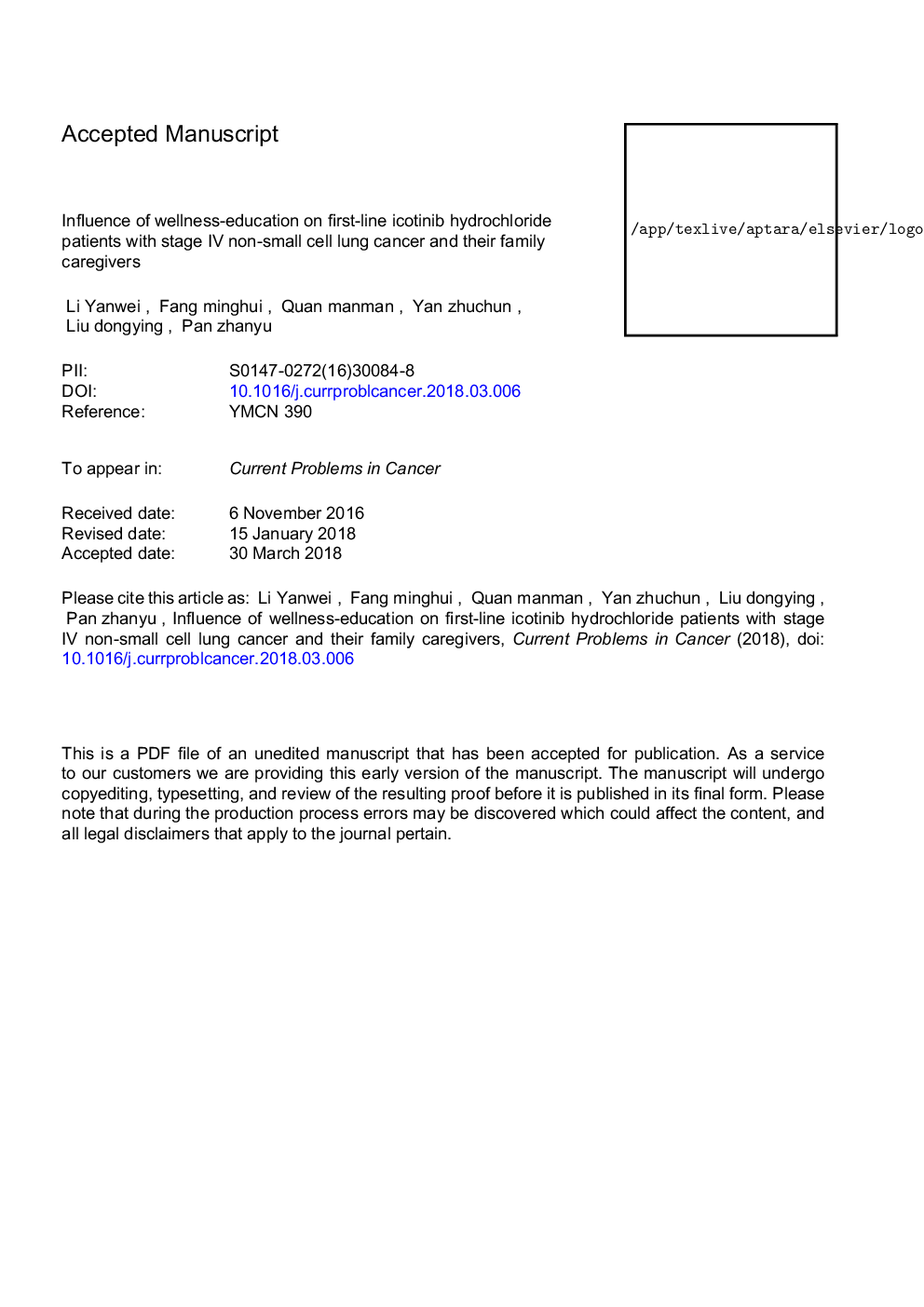| کد مقاله | کد نشریه | سال انتشار | مقاله انگلیسی | نسخه تمام متن |
|---|---|---|---|---|
| 8733805 | 1590733 | 2018 | 12 صفحه PDF | دانلود رایگان |
عنوان انگلیسی مقاله ISI
Influence of wellness education on first-line icotinib hydrochloride patients with stage IV non-small cell lung cancer and their family caregivers
ترجمه فارسی عنوان
تأثیر آموزش سلامتی در بیماران مبتلا به ایکوتینیب هیدروکلراید خط اول سلولهای ریه غیر سلولی و مراقبین خانواده آنها
دانلود مقاله + سفارش ترجمه
دانلود مقاله ISI انگلیسی
رایگان برای ایرانیان
کلمات کلیدی
موضوعات مرتبط
علوم پزشکی و سلامت
پزشکی و دندانپزشکی
هماتولوژی
چکیده انگلیسی
Objective: This study aims to examine the effects of wellness education (WE) intervention on the behavioral change, psychological status, performance status on patients with stage IV non-small cell lung cancer (NSCLC) undergoing icotinib hydrochloride treatment and their relationships with family caregivers. Methods: We conducted an intervention study involving 126 individuals with confirmed activating epidermal growth factor receptor mutation-positive stage IV NSCLC who received icotinib hydrochloride as first-line therapy between January 2014 and January 2016; their caregivers were also included in the study. For a period of 12 weeks, participants were randomly assigned into WE and control groups. The patients and family members in the WE group were provided with WE information about treatment, diet, social needs, rehabilitation, physical/mental health education, communication strategies, and patient care advice at least 3 times per week during treatment. Qualitative feedback of the participants was recorded during the intervention. Food Composition Database, the Family Environment Scale, patients/caregivers quality-of-life (Functional Assessment of Cancer Therapy-Lung/Caregiver Quality of Life Index-Cancer Scale), and Hospital Anxiety and Depression Scale (HADS) were measured at baseline and for 12 weeks. Data were analyzed to compare the different outcomes. Results: Of the 126 caregivers (64 WE and 62 control), 120 completed the study. We observed significant differences between the WE group and control group with respect to low daily calorie intake (31.0% vs 77.4%, p < 0.05), smoking cessationaaa and awareness of cancer (85.48% vs 100%, p < 0.05). The WE group showed high ratings on awareness of cancer risk and benefit, as well as confidence relating to the behaviors of healthful diet and self-motivation to conduct cancer test. Family caregivers had high ratings on 30-minute daily moderate physical activity (p > 0.05). After 12 weeks, WE intervention had improved scores on Functional Assessment of Cancer Therapy-Lung-EWB and Caregiver Quality of Life Index-Cancer Scale adaptation. In addition, the patients also showed improvements in HADS. Conclusion: WE interventions in patients with stage IV NSCLC undergoing icotinib hydrochloride treatment and their family resulted in strong intentions to engage in health-promoting behaviors related to physical activity, smoking cessationaaa, and nutrition at the treatment period. WE intervention is a viable way to improve quality of life and HADS. Practice implications: Findings from this study suggest that WE interventions in patients' family with stage IV NSCLC undergoing icotinib hydrochloride treatment are significant improvements in both HADS and quality of life. These data also indicate that lung cancer disparities are unlikely to be associated with differential willingness to receive care but that Chinese may perceive financial and insurance ebarriers to treatment.
ناشر
Database: Elsevier - ScienceDirect (ساینس دایرکت)
Journal: Current Problems in Cancer - Volume 42, Issue 3, MayâJune 2018, Pages 358-366
Journal: Current Problems in Cancer - Volume 42, Issue 3, MayâJune 2018, Pages 358-366
نویسندگان
Li Yanwei, Fang Minghui, Quan Manman, Yan Zhuchun, Liu Dongying, Pan Zhanyu,
